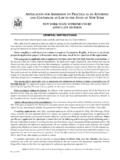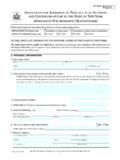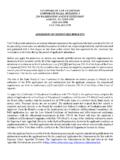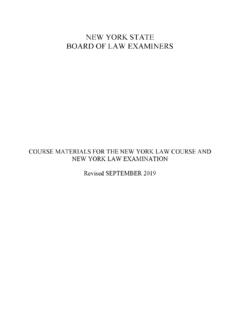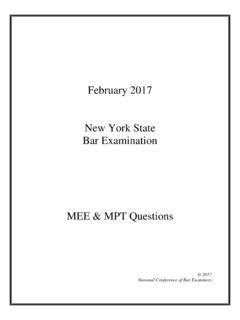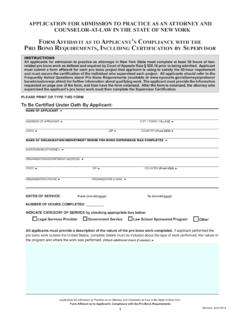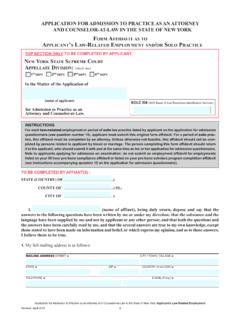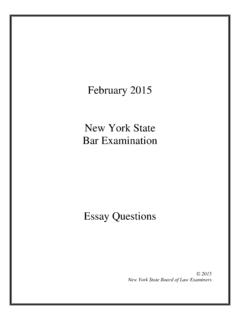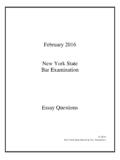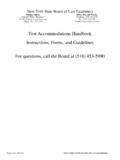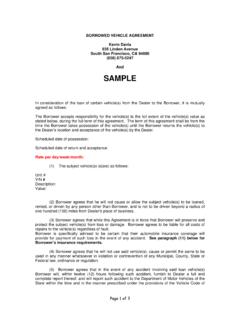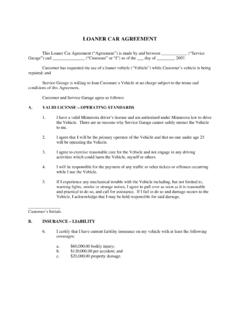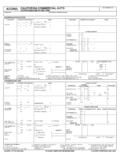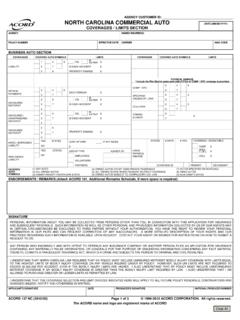Transcription of July 2015 New York State Bar Examination - Bole
1 July 2015 New york State Bar Examination Essay Questions 2015 New york State Board of Law Examiners 1 QUESTION 1 In 1990, Bob, then a resident of State X, purchased a lakefront home in New york State . From the time he purchased the property, Bob reasonably believed the northern boundary to be five feet north of the true northern boundary line and the southern boundary to be five feet south of the true southern boundary line. Bob occupied the property every summer. The first summer he erected a fence along what he believed to be the southern boundary. Bob did nothing to occupy or cultivate the five-foot strip north of the true northern boundary line until 2004, when he cleared it and extended his lawn onto that five-foot strip, which he then regularly mowed. That same year he also erected a storage shed on the northerly five-foot strip.
2 In 2010, Bob married Marsha in State X, where they resided, although they spent their summers at Bob s lakefront home. In May 2014, Bob and Marsha moved from State X to New york City. Shortly after moving to New york , Bob and Marsha executed an agreement in which each agreed to waive any right of election against the other s will. Bob and Marsha signed the agreement before two witnesses who also signed the agreement. In February 2015, Marsha left their marital home in New york and returned to State X, indicating that she was never going to return to New york or to Bob wherever he might live. In June 2015, Bob commenced an action in New york against Marsha for divorce on the ground of irretrievable breakdown of the marriage and for equitable distribution of the marital assets. Bob caused the summons and complaint to be personally served on Marsha in State X by an authorized State X process server.
3 Marsha has moved to dismiss the complaint on the grounds that (a) it fails to State a cause of action as to the alleged ground for divorce, (b) the residency requirement for bringing the action was not satisfied, and (c) the court (i) lacks jurisdiction over the subject matter of the action and (ii) lacks personal jurisdiction over Marsha. 1. (a) If Bob brings an action to establish his having title to the northern strip, should he be successful? (b) If Bob brings an action to establish his having title to the southern strip, should he be successful? 2 2. Should the court grant Marsha s motion to dismiss the complaint? Discuss each of grounds (a), (b) and (c). 3. Is the agreement signed by Bob and Marsha enforceable? QUESTION 2 In 1980 Drake, an art collector, and his wife, Win, had a son, Ron. Ten years later, as the result of an extra-marital affair with Mary, Drake fathered a daughter, Betty.
4 No DNA test was ever performed, and Mary never sought a court order to establish paternity. Although Drake never openly acknowledged paternity, he entered into an agreement with Mary obligating him to provide financial support to Betty until she was 21 years old. Except for providing the agreed financial support, Drake had no contact with Betty. In May 2010, Drake purchased a painting from a famous artist and hung the painting in his bedroom. In 2011, Drake made a series of bad investment decisions leading to significant financial losses. He borrowed $200,000 from B Bank and gave B Bank a security interest in the painting as collateral. In 2012, on Ron s graduation from law school, Drake wrote Ron a letter stating, I give you the painting in my bedroom in celebration of your graduation.
5 You can take possession of the painting upon my death, but I want to keep possession of the painting for as long as I live. The painting remained in Drake s bedroom until March 2014, when he died without a will, survived by Win, Ron and Betty. At the time of his death, Drake s estate, not including the painting, was valued at $1,000,000, the value of the painting was $300,000, and the balance of the debt owed to B Bank was $150,000. Win and Ron both filed petitions for letters of administration for Drake s estate. Ron claimed that he was best qualified to administer the estate because he was a lawyer as well as being Drake s son, while Win claimed, that as Drake s wife, she should be appointed administrator of the estate. The Surrogate granted letters of administration to Ron. Ron has informed Win that the painting is not part of the estate because the painting was a gift to him.
6 Win claims that Drake s letter to Ron was insufficient to establish a gift of the painting. Ron informed Betty that, as a non-marital child of Drake, she would not share in the distribution of the estate. Ron also informed B Bank that its security interest in the painting was extinguished by the gift to him. 3 1. Was the Surrogate s ruling granting letters of administration to Ron correct? 2. Should the painting be included as part of Drake s estate? 3. Did B Bank s security interest survive the gift of the painting? 4. What are the respective rights, if any, of Ron, Win, and Betty, with respect to Drake s estate? QUESTION 3 ABC Appliance Store (ABC) put a sign in its window that read: Super Bowl sale Watch the Super Bowl on our super-sized 82-inch television. Dan saw the sign and told Manager, the manager of the store, that he needed a new television and wanted to buy the 82-inch television because he intended to have a big Super Bowl party.
7 Manager agreed that this television would be perfect for watching the Super Bowl. Dan then purchased the 82-inch television for $6,000, signing a purchase agreement that provided for no money down and payment not due for 90 days. The television was delivered to Dan s house the next day together with a lengthy owner s manual, which contained the following statement on the last page in a footnote: Operation may be affected by severe lightning. Dan did not read the owner s manual. Dan used the television without incident over the next two months. However, on the day of the Super Bowl, Dan was unable to obtain reception on the channel that broadcast the game because of severe lightning storms near his house, and he had to cancel his Super Bowl party. Dan had incurred significant expense in planning for the cancelled Super Bowl party.
8 The next day, Dan called Manager at ABC and demanded that ABC take the television back because it did not operate during the Super Bowl. Manager refused, citing to the statement in the owner s manual. Dan thereafter refused to pay for the television when payment became due. Manager contacted Attorney to assist in obtaining payment for the television. Attorney agreed in writing to handle the matter on a contingent fee basis, in which Attorney would receive 50% of the amount recovered. Attorney then sent a letter to Dan labeled final notice which advised Dan that, unless Dan paid the $6,000 in full within 30 days, Attorney had been directed by ABC to bring a lawsuit against him. Dan received the letter, but did not reply and did not pay what was demanded. ABC brought an action against Dan to recover the purchase price of the television.
9 Dan answered and denied liability on the ground that he had properly revoked his 4 acceptance of the television because the television was non-conforming. Dan counterclaimed, asserting that ABC had breached the implied warranties of merchantability and fitness for a particular purpose and seeking damages for the loss he incurred in cancelling the Super Bowl party. Neither the purchase agreement nor the owner s manual contained any mention of warranties or damages. In its reply to Dan s counterclaim, ABC alleged that the statement in the owner s manual effectively disclaimed any warranties. 1. Was Dan entitled to revoke his acceptance on the ground that the television did not conform to the contract due to its failure to operate during the Super Bowl?
10 2. (a) Did the statement in the owner s manual effectively disclaim the warranties of merchantability and fitness for a particular purpose? (b) Assuming the statement in the manual did not disclaim any warranties, is Dan entitled to recover consequential damages based on breach of: (i) a warranty of merchantability? (ii) a warranty of fitness for a particular purpose? 3. Did Attorney s (a) contingent fee agreement and (b) sending of the demand letter comport with the Rules of Professional Conduct? QUESTION 4 Ed owns a 20-acre parcel of land in a rural area and keeps an all-terrain vehicle (ATV) there for his family s use. The ATV, a motorized vehicle used for recreational purposes, is designed to travel on unpaved surfaces at speeds up to 25 miles per hour. Ed regularly permits his children to use the ATV unsupervised, including his 12-year-old son, Bill, who has done so on many occasions without incident.
